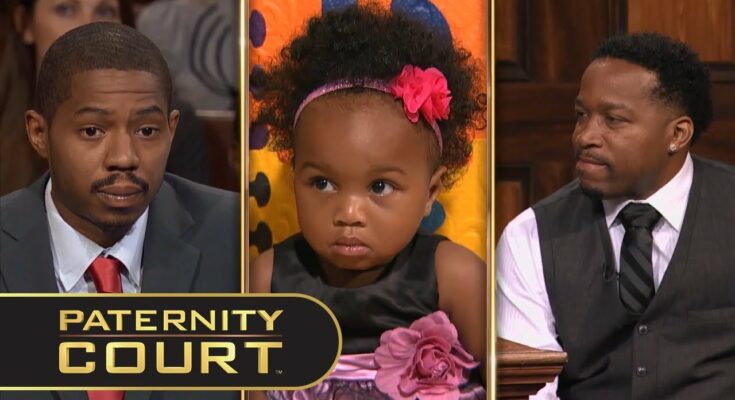The case involves three main parties: Mr. Moses, Ms. Lightle, and Mr. Green, who find themselves entangled in a complex dispute over the paternity of a one-year-old girl named Lamiyah.
Mr. Moses claims he is the father of Lamiyah, having “signed the birth certificate and been present in her life.” His assertion of paternity is not just based on a legal document, but also on the emotional bond he has formed with the child. Despite the uncertainty surrounding Lamiyah’s paternity, Mr. Moses has stepped up to the role of a father, demonstrating a commitment to the child’s well-being.
However, Ms. Lightle, the mother of the child, vehemently denies Mr. Moses’s paternity. She “hopes to never see Mr. Moses again,” expressing a strong desire to end the paternity dispute and cut ties with Mr. Moses. This sentiment underscores the strained relationship between Ms. Lightle and Mr. Moses, and the emotional toll the paternity dispute has taken on them.
The stakes are high for Mr. Moses as he “wants to continue being a great father.” His desire to maintain a role in Lamiyah’s life is evident, but Ms. Lightle’s resistance and their communication issues make this a challenging endeavor. The situation highlights the complexities and challenges that can arise when personal relationships and parental responsibilities intersect.
Ms. Lightle admits to “sleeping with another man around the time of conception,” introducing another potential father into the mix. Despite this, she also had a sexual relationship with Mr. Moses. The couple “lived together but were not in a committed relationship,” adding another layer of complexity to the situation. Mr. Moses was present when Ms. Lightle found out she was pregnant and was with her during labor, further deepening his emotional connection to the child.
The case takes a dramatic turn when another man, Mr. Green, is brought into the picture. Ms. Lightle “wants Mr. Green to be the father,” while Mr. Moses “hopes to be the biological father.” The introduction of Mr. Green adds another layer of complexity to the case, creating a triadic dispute that further complicates the determination of Lamiyah’s paternity.
Despite the toxic relationship between Ms. Lightle and Mr. Moses, she insists that “it wasn’t always bad.” This statement suggests a history of ups and downs in their relationship, which may have contributed to the current situation. It also hints at the possibility of unresolved feelings and issues between the two.
The DNA test results provide a shocking revelation: “Mr. Green is the biological father of Lamiyah.” This result is a pivotal moment in the case, conclusively disproving Mr. Moses’s claims and vindicating Ms. Lightle’s belief. Mr. Moses is disappointed but “glad to know the truth,” demonstrating his commitment to truth and transparency.
The judge commends Mr. Moses for “stepping up to possibly be the father of Lamiyah,” even though there is uncertainty. The judge urges Mr. Moses and Ms. Lightle to “put their personal issues aside so that Lamiyah can have closure and potentially have her biological father’s name on her birth certificate.” These words of wisdom serve as a reminder of the importance of prioritizing the child’s needs and well-being above personal disputes and emotions.
The episode is a vivid portrayal of the emotional turmoil, accusations, and counter-accusations that often accompany paternity disputes. It highlights the importance of honesty, responsibility, and prioritizing the child’s well-being above all else. It also underscores the legal implications of actions such as signing a birth certificate, and the need for individuals to be fully aware of these implications before making such decisions.
The judge’s role in this episode is noteworthy. She not only presides over the case but also provides valuable advice and guidance to both parties. She criticizes Mr. Moses for treating the birth certificate as a consolation prize and not taking responsibility for his actions. She also advises Ms. Lightle to be honest and not live in denial, and to use her strength and resources to identify her child’s biological father. These words of wisdom serve as a reminder of the importance of truth and responsibility in such complex situations.
The episode ends on a note of resolution, with the revelation of the true biological father. However, it also leaves viewers with a sense of the ongoing challenges that the parties involved will face as they navigate their relationships with each other and with Lamiyah. It underscores the need for ongoing communication, understanding, and cooperation in order to ensure the best possible outcome for the child.
In conclusion, the video “Moved In Together Without Commitment” is a compelling exploration of a complex paternity case. It delves into the emotional turmoil and uncertainty faced by a young woman trying to prove the paternity of her son, and two men each hoping to be the biological father. It underscores the importance of honesty, responsibility, and prioritizing the child’s well-being in navigating such complex personal and legal matters. It also highlights the role of the court in providing guidance and ensuring justice in such cases.



